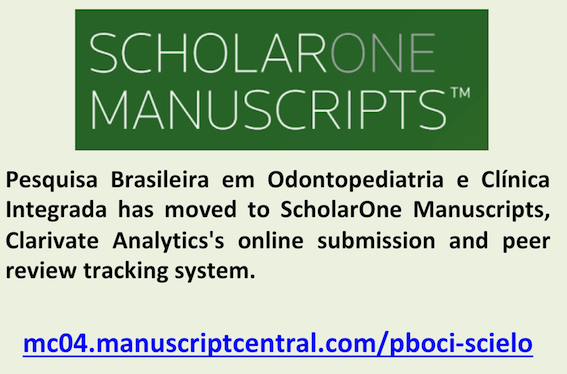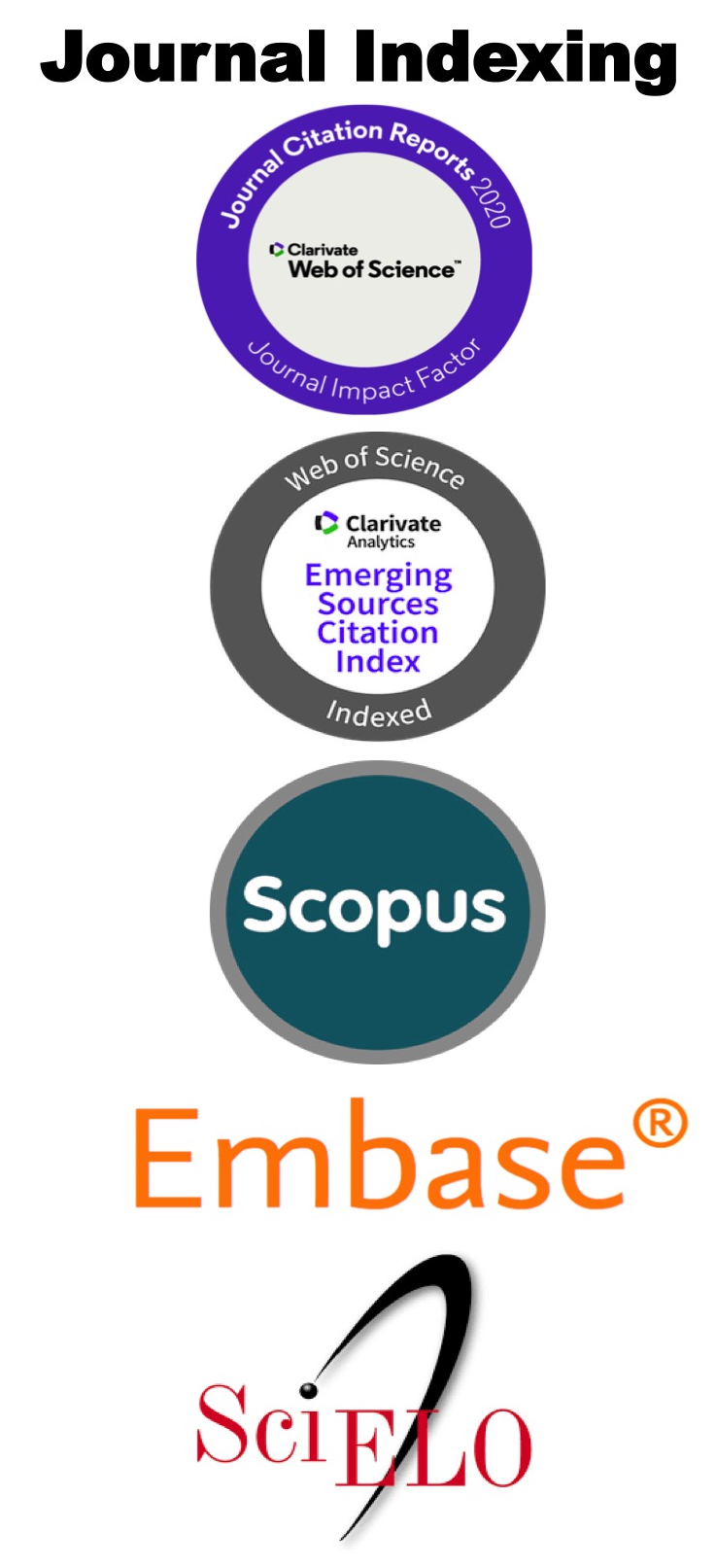Pediatric Oral Health Self-reported by Caregivers of Normal-Hearing and Hearing-Impaired Children
Keywords:
Child, Epidemiology, Oral Health, Deafness, Social InclusionAbstract
Objective: To verify and compare the sociodemographic data and caregivers’ self-perception of children’s oral health condition, hygiene habits and seek for dental services among family units of deaf and normal-hearing children. Material and Methods: A comparative cross-sectional study was conducted with 64 parents/caregivers of 16 deaf and 48 normal-hearing children of 3-14 years old, belonging to reference centers in Belo Horizonte, southeastern Brazil. Deaf and hearing children were matched according to their sex and age. Sociodemographic characteristics of the family units and self-report of oral health conditions and care were assessed using a structured questionnaire, including information regarding seeking pediatric dental services. Descriptive analysis and chi-square test were performed (p<0.05). Results: Most individuals in the sample were mothers (84.4%). Low family income (p=0.024) and higher education level of guardians (p=0.018) were associated with families of hearing children. The report of clinical treatment or toothache as the main reason for the children’s last dental appointment was associated with families of deaf children (p=0.047). Conclusion: Based on caregivers’ reports, hearing-impaired children demonstrated greater vulnerability to present dental pain or clinical treatment as the main reasons for their last access to dental appointments.References
World Health Organization. WHO Global Disability Action Plan 2014-2021: Better Health for All People with Disability. 25p. 2015. Geneva, Switzerland: World Health Organization. Available from: https://apps.who.int/iris/handle/10665/199544. [Accessed on July 14, 2021].
Souza MFNS, Araújo AMB, Sandes LFF, Freitas DA, Soares WD, Vianna RSM, et al. Main difficulties and obstacles faced by the deaf community in health access: an integrative review. Rev CEFAC 2017; 19(3):395-405.
Kuenburg A, Fellinger P, Fellinger J. Health care access among deaf people. J Deaf Stud Deaf Educ 2016; 21(1):1-10. https://doi.org/10.1093/deafed/env042
Singh A, Agarwal A, Aeran H, Dhawan P. Oral Health & quality of life in preadolescents with hearing impairment in Uttarakhand, India. J Oral Biol Craniofac Res 2019; 9(2):161-5. https://doi.org/10.1016/j.jobcr.2019.03.004
Ramires CMN, Branco-Barreiro FCA, Peluso ETP. Quality of life related factors for parents of children with hearing loss. Cienc Saúde Colet 2016; 21(10):3245-52. https://doi.org/10.1590/1413-812320152110.22472015
Campos V, Cartes-Velásquez R, McKee M. Oral health and dental care in deaf and hard of hearing population: a scoping review. Oral Health Prev Dent 2020; 18(1):417-26. https://doi.org/10.3290/j.ohpd.a44687
Shivakumar KM, Raje V, Kadashetti V. Dental caries experience and oral hygiene status among hearing and speech impaired children of Karad city, Maharashtra, India. J Int Oral Health 2018; 10(6):283-6. https://doi.org/10.4103/jioh.jioh_181_18
Dammeyer J, Hansen AT, Crowe K, Marschark M. Childhood hearing loss: impact on parents and family life. Int J Pediatr Otorhinolaryngol 2019; 120:140-5. https://doi.org/10.1016/j.ijporl.2019.02.027
Szarkowski A, Brice PJ. Hearing parents’ appraisals of parenting a deaf or hard-of-hearing child: application of a positive psychology framework. J Deaf Stud Deaf Educ 2016; 21(3):249-58. https://doi.org/10.1093/deafed/enw007
Blank A, Holt RF, Pisoni DB, Kronenberger WG. Associations between parenting stress, language comprehension, and inhibitory control in children with hearing loss. J Speech Lang Hear Res 2020; 63(1):321-33. https://doi.org/10.1044/2019_JSLHR-19-00230
Marquete VF, Reis P, Silva ES, Marchini KB, Costa MAR, Marcon SS. Influence of parents’ communication skills on health guidelines for deaf children. Rev Enferm UERJ 2020; 28:e52265. https://doi.org/10.12957/reuerj.2020.52265
Gomes MC, Perazzo MF, Neves ÉTB, Souza EGC, Araújo LJS, Martins CC, et al. Can dental pain be a cause of irritability in children and family distress? J Public Health 2020; 28:411-7. https://doi.org/10.1007/s10389-019-01025-z
Harmer LM. Health care delivery and deaf people: practice, problems, and recommendations for change. J Deaf Stud Deaf Educ 1999; 4(2):73-110. https://doi.org/10.1093/deafed/4.2.73
Jackson CW, Wegner JR, Turnbull AP. Family quality of life following early identification of deafness. Lang Speech Hear Serv Sch 2010; 41(2):194-205. https://doi.org/10.1044/0161-1461(2009/07-0093)
Iebni JY, Ziapour A, Khosravi B, Kandi ZRK. Lived experience of mothers of children with disabilities: a qualitative study of Iran. J Public Health 2021; 29:1173-9. https://doi.org/10.1007/s10389-020-01215-0
Vilaseca R, Rivero M, Ferrer F, Bersabé RM. Parenting behaviors of mothers and fathers of young children with intellectual disability evaluated in a natural context. PLoS ONE 2020; 15(10):e0240320. https://doi.org/10.1371/journal.pone.0240320
Riggs E, Kilpatrick N, Slack-Smith L, Chadwick B, Yelland J, Muthu MS, et al. Interventions with pregnant women, new mothers and other primary caregivers for preventing early childhood caries. Cochrane Database Syst Rev 2019; 11:CD012155. https://doi.org/10.1002/14651858.CD012155.pub2
Ministry of Health. Brazilian Institute of Geography and Statistics. IBGE. National Health Survey – Information on households, access and use of health services. Rio de Janeiro, RJ, Brazil; 2020.
National Federation of Deaf Education. About Feneis. Available from: https://feneis.org.br/sp/sobre/. [Accessed on July 14, 2021].
Vichayanrat T, Kositpumivate W. Oral health conditions and behaviors among hearing impaired and normal hearing college students at Ratchasuda College, Nakhon Pathon, Thailand. Southeast Asian J Trop Med Public Health 2014; 45(5):1228-35.
Humphries T, Kushalnagar P, Mathur G, Napoli DJ, Rathmann C, Smith S. Support for parents of deaf children: Common questions and informed, evidence-based answers. Int J Pediatr Otorhinolaryngol 2019; 118:134-42. https://doi.org/10.1016/j.ijporl.2018.12.036
Whicker JJ, Muñoz K, Nelson LH. Parent challenges, perspectives and experiences caring for children who are deaf or hard-of-hearing with other disabilities: a comprehensive review. Int J Audiol 2019; 58(1):5-11. https://doi.org/10.1080/14992027.2018.1534011
Vukkadala N, Giridhar SBP, Okumura MJ, Chan DK. Seeking equilibrium: The experiences of parents of infants and toddlers who are deaf/hard-of-hearing. J Pediatr Rehabil Med 2019; 12(1):11-20. https://doi.org/10.3233/PRM-170528
Hall WC, Smith SR, Sutter EJ, DeWindt LA, Dye TDV. Considering parental hearing status as a social determinant of deaf population health: Insights from experiences of the “dinner table syndrome”. PLoS One 2018; 13(9):e0202169. https://doi.org/10.1371/journal.pone.0202169
Smith SR, Samar VJ. Dimensions of deaf/hard-of-hearing and hearing adolescents’ health literacy and health knowledge. J Health Commun 2016; 21(2):141-54. https://doi.org/10.1080/10810730.2016.1179368
Ministry of Health. Decree 5626/05, which regulates the Law nº 10436 of April 24th of 2002. Brasília: Ministry of Health, 2005. Available from: https://www2.camara.leg.br/legin/fed/decret/2005/decreto-5626-22-dezembro-2005-539842-publicacaooriginal-39399-pe.html. [Accessed on July 14, 2021].
Rocha LL, Saintrain MVL, Vieira-Meyer APGF. Access to dental public services by disabled persons. BMC Oral Health 2015; 15:35. https://doi.org/10.1186/s12903-015-0022-x
Santos KSA, Gomes RCB, Ribeiro AIAM, Dantas DCRE, Sampaio CS, Augusto SM. Conhecimento e percepção dos pacientes sobre saúde bucal. RFO UPF 2015; 20(3):287-94. [In Portuguese].
Freeman R, Doughty J, Macdonald ME, Muirhead V. Inclusion oral health: advancing a theoretical framework for policy, research and practice. Commun Dent Oral Epidemiol 2020; 48(1):1-6. https://doi.org/10.1111/cdoe.12500
Möller CC, Ibaldo LTS, Tovo MF. Evaluation of the oral health conditions of deaf schoolchildren in the city of Porto Alegre, RS, Brazil. Pesqui Bras Odontoped Clin Integr 2010; 10(2):195-200. https://doi.org/10.4034/1519.0501.2010.0102.0011
Downloads
Published
How to Cite
Issue
Section
License
Copyright (c) 2022 Pesquisa Brasileira em Odontopediatria e Clínica Integrada

This work is licensed under a Creative Commons Attribution-NonCommercial 4.0 International License.



